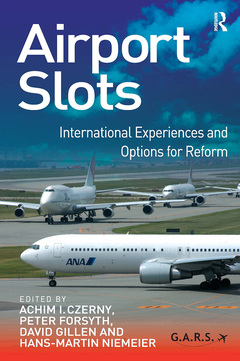Contents: Introduction and overview, Achim I. Czerny, Peter Forsyth, David Gillen and Hans-Martin Niemeier; Part A The Current Slot Allocation System: How the present (IATA) slot allocation works, Claus Ulrich; Economic perspectives on the problem of slot allocation, Batool Menaz and Bryan Matthews; Airport slots: a primer, David Gillen. Part B Congestion, Slots, and Prices: Setting the slot limits at congested airports, Peter Forsyth and Hans-Martin Niemeier; The problem of charging for congestion at airports: what is the potential of modelling?, Milan Janic; Managing congested airports under uncertainty, Achim I. Czerny; Prices and regulation in slot constrained airports, Peter Forsyth and Hans-Martin Niemeier. Part C Airline Strategies and Competition: Do airlines use slots efficiently? Jörg Bauer; Slots and competition policy: theory and international practice, David Gillen and William G. Morrison; The dilemma of slot concentration at network hubs, David Starkie; How the market values airport slots: evidence from stock prices, David Gillen and Despina Tudor; Flight and slot valuations under alternative market arrangements, William Spitz. Part D International Experiences: The development of the regulatory regime of slot allocation in the EU, Matthias Kilian; Slots, property rights and secondary markets: efficiency and slot allocation at US airports, Daniel M. Kasper. Part E Auctions and Alternatives: Auctions - what can we learn from auction theory for slot allocation?, Kenneth Button; Formal ownership and leasing rules for slots, Erwin von den Steinen. Part F Reforming the Slots System: Extraction of economic rent under various airport slot allocation approaches, Kenneth Button; The slot allocation philosophy at the EU, Frederik Sørensen; Airport slots: perspectives and policies, Peter Forsyth; References; Appendix, Natalie McCaughey, Peter Forsyth and David Starkie; Index.

